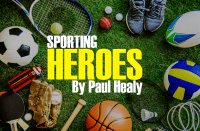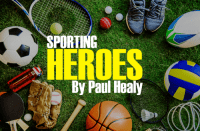‘At 24, the Clones Cyclone has swept one
of the great champions out of the way…’
The golden era of heavyweight boxing – that epic theatre served up in the early 1970s, with Ali, Frazier and Foreman as modern-day gladiators – was all I needed when it came to the so-called noble art.
I have to confess to being barely aware of the other weight divisions. Looking back, I doubt if they had any of the media profile of the heavyweight division.
Maybe it fell to Harry Carpenter to break it to me…the reality that there was quality boxing fare beyond the mad circus of the heavyweight scene.
Harry was the likeable BBC commentator, all cheerful and chappy, like a favourite uncle. His commentaries were breathless, excited, enthusiastic. By around 1980, and with TV coverage of the sport increasing all the time, I realised there were great champions who didn’t have to be built like George Foreman. I guess it makes sense, when you have so many different weight divisions!
Yet, this was an eye-opener to many of us. Truth is, we had been drawn to boxing because of the amazing charisma of Ali…and once he was centre stage, all eyes were on those epic heavyweight showdowns, with Ali – the hype-master extraordinaire – expertly orchestrating it all. The heavyweight scene was where glamour, courage, power, money, superstardom, success and heartbreak met and intertwined. Millions of fans lapped it up. “Ladies and gentlemen, welcome to Madison Square Garden!”
But now, my generation discovered there were exceptional pugilists below the heavyweight division. There were great champions there too, and emerging rivalries that would make the 1980s very memorable. There was, as in the heavyweight division, tragedy and triumph, the whiff of menace merged with the promise of supreme sporting combat.
We discovered Marvelous Marvin Hagler, Sugar Ray Leonard, Thomas Hearns, Roberto Duran and others…a new cast of characters, great athletes…brave warriors…some of them amongst the most gifted and courageous the sport has seen.
Personally – and I think it’s broadly true of many of my generation – the 1980s, aided by clever marketing and growing TV coverage, opened a new window on a sport which, for all its dubious aspects, we find it so hard to look away from. Yes, this was one long golden era for this sometimes brutal sport; and we couldn’t get enough of the combatants.
Meanwhile, in Clones…
Cyclone warning
I won’t claim to be an expert on Barry McGuigan, or on boxing generally – because I’m not. Did I know much about Barry McGuigan before the early 1980’s? Probably not.
I am, mind you, well aware of how Ireland…eh…punches above its weight in this sport. I’m no expert, but I reckon we’re a truly great boxing nation. We’ve produced great boxers, including many world champions. We’ve become a real force in the Olympics. Fast-forward (from the McGuigan era) to 1995 and I’ll never forget the atmosphere when watching Steve Collins in two great fights with Chris Eubank.
Back to Barry. By 1985, the ‘Clones Cyclone’ was already an Irish hero. He was European Champion. There had been many great nights at the King’s Hall in Belfast, McGuigan thrilling fans. The public loved his all-action style. We loved his personality too. He managed to cross the political divide, being popular in the Republic, the North, and the UK.
My late father informed me of an interesting fact. Barry’s father had sung in our bar! Our family opened the renowned Kon Tiki Bar & Lounge in Rooskey in 1970. We had many top performers on stage, including Pat McGuigan, who had represented Ireland in the 1968 Eurovision Song Contest.
Back to Barry (again). By the summer of ’85, the Clones man – brilliantly promoted by Barney Eastwood (though they later had a very high profile falling out) had earned his shot at a world featherweight title.
His opponent would be Eusebio Pedroza. The Panamanian boxer had an incredible record. By 1985, he was unbeaten as world champion for over seven years. While he was older than McGuigan, and arguably beginning to decline, he was a great champion with a phenomenal record (18 successful defences)…and it seemed unlikely that he would be beaten.
The venue was Loftus Road, home of London soccer club Queens Park Rangers. The date was 8th of June 1985. Barry McGuigan went through his pre-bout routine in his dressing room. He could hear thunderous noise outside, the stadium bulging with thousands of Irish fans. In the dressing room across from him, a cool, calm champion. Eusebio Pedroza had done this for seven years. Unbeaten champion of the world. Muhammad Ali once claimed to have “handcuffed lightning and thrown thunder in jail”. You suspected, with his imposing gravitas and ringcraft, that Pedroza could most likely stop a cyclone, however fiercely it raged.
Loftus Road, 8 June 1985 (Round 7)
‘McGuigan’s work has not been so effective in this round. He hasn’t found the range. Yes he did, he’s got him with a right! Oh! The champion’s over in the seventh! He found him with a right! The compulsory count…is the title about to change hands? 30 seconds to go. Can McGuigan do it here and now? We thought he’d find him with a left hook, and he found him with a right…I can hardly hear myself speak to you, under the inferno of sound!’
Later…
‘I’ve never heard such a sound in my life as this crowd is creating here…McGuigan going for the win…ten seconds (left)…and Pedroza is going to survive. What a marvellous champion. And that surely must be the end of Pedroza’s reign as champion…McGuigan is the champion! They’ve (the judges) voted for him…and 25,000 people in the stadium have voted for him. At 24, the Clones Cyclone has swept one of the great champions out of the way…’
– BBC commentator Harry Carpenter
‘The punch of a lifetime’
My family had moved from Rooskey to Strokestown, having bought a small hotel (the Strokestown Arms). An exotic new world!
We were only open a day or two when the McGuigan-Pedroza fight came up. The bar in the Strokestown Arms was packed. Loftus Road was packed. Little did we realise, one of the great Irish sporting moments was about to present itself. It was before the era of pubs having three/four/five TV screens in a premises. We had one television, propped high in the centre of the long bar. What an atmosphere!
Before the fight began, Barry’s father, Pat McGuigan (Eurovision, Kon Tiki in Rooskey!) stood in the crowded ring and sang an emotional version of Danny Boy. Thousands of Irish fans present in Loftus Road sang it with him (see YouTube). Unforgettable.
The place exploded with raucous joy when McGuigan downed Pedroza with that glorious punch in Round 7. What a sporting moment! McGuigan was relentless, full of energy and youth, and packing a punch too. A terrifically exciting fighter. Pedroza was magnificent too. He was proud, stubborn, a true champion. Challenged now by Father Time – and by a hungry, brilliant young opponent – Pedroza heroically survived to the final bell, all 15 rounds. Sheer pride had kept him going. But he had been downed by a textbook right – the punch of a lifetime – and he had been beaten. The judges confirmed that Barry McGuigan was the winner on points, and the new WBA Featherweight Champion of the World.
McGuigan, who later lost his title to Steve Cruz (an ill-fated choice, given the punishing heat of Las Vegas) remains one of the most popular figures in boxing. These days, he’s a successful promoter and a highly-respected pundit.
Because of one magical night in particular, but also because of a swashbuckling career which peaked in Loftus Road stadium – and because he was such an exciting fighter and such a great ambassador for this island – Barry McGuigan will always be an Irish sporting hero. (I’ve never met him…but read on…).
Mrs McGuigan’s shop…
A footnote: How times have changed. From 1986 to 1988, I was working in Cavan Town. A little while after Barry McGuigan beat Pedroza and won the world title, I found myself in Clones one day. GAA fans will be familiar with the steep entry to this quaint town and its big square (‘The Diamond’). Knowing that Barry McGuigan lived in Clones, and that his mother had a shop in the town, I drove around to have a look. To my surprise, parked in the square opposite McGuigan’s Foodmarket was Barry McGuigan’s sports car. I can’t recall what model it was, but I’d seen a photo of the world champion and his fancy sports car in the papers. Now, here it was, parked opposite his mother’s shop, without any of the security or airs or graces one might have expected. It was a bit of a thrill just to see it; if I recall correctly it had ‘Clones Cyclone’ emblazoned somewhere on its flashy exterior (somewhere in the world, someone was working on smartphones and the concept of selfies). There was nobody around; just me and a world champion’s flashy car. I went into the shop, and there was Barry McGuigan’s mother, a small, friendly woman, living the life of the small shopkeeper: handing cigarettes over the counter, chit-chatting with locals, her singing till reminiscent of the bell at a boxing ring. I’m pretty sure I wasn’t brave or audacious enough to ask ‘Is Barry in?’. Instead, I bought a bar of chocolate from the mother of the man who downed Pedroza. Back outside, I admired the world champion’s car a final time before getting back into my long-suffering and extremely modest Toyota Starlet, by now as dinted and traumatised as poor Pedroza’s jaw!





